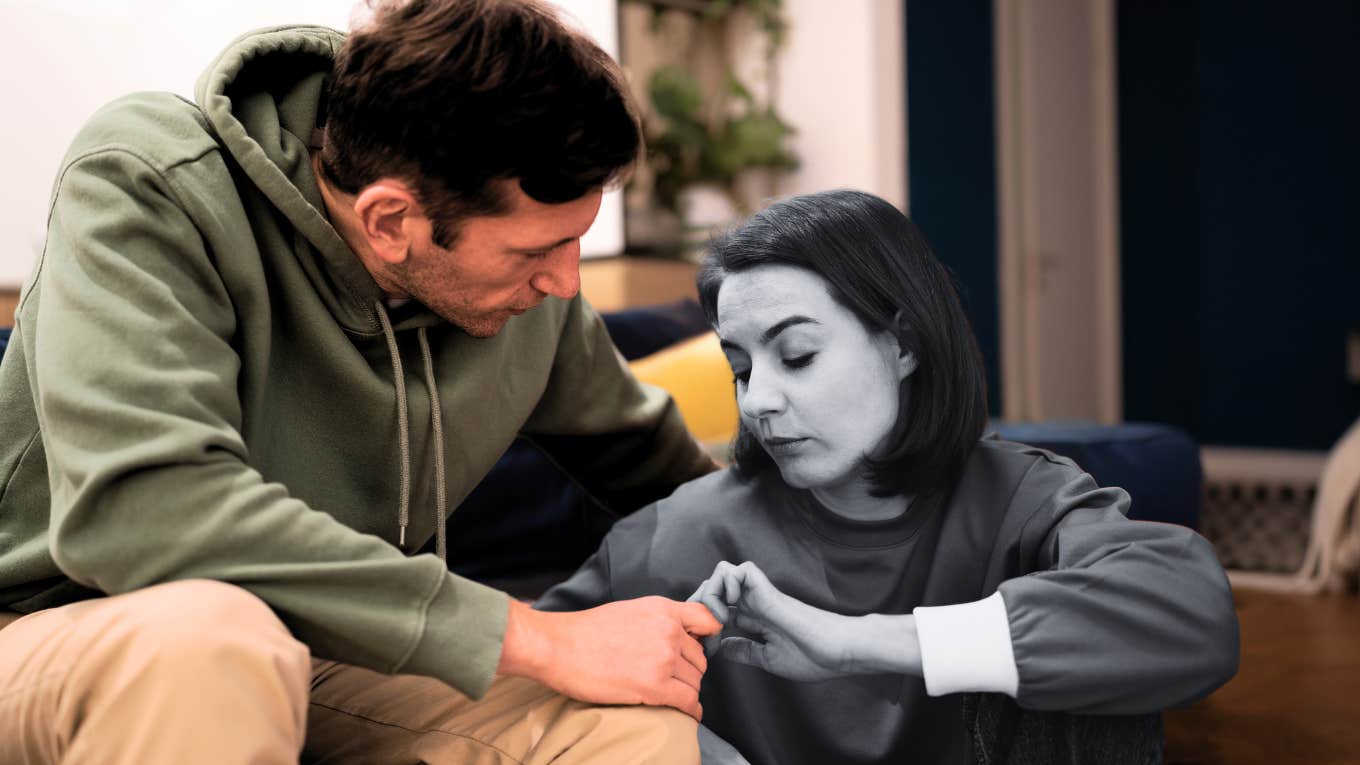I’m In Trauma Therapy And Give My Boyfriend A Recap Of Every Session
It’s not exactly comfortable, but it’s a game-changer for our relationship.
 dimaberlinphotos | Canva
dimaberlinphotos | Canva Every Wednesday at 4:00 p.m., I sit down at my computer, join a video call with my therapist, and watch a glowing square bounce from left to right. I’m transported back to my most traumatizing memories. The emotions rise and take over. For the first time, I feel the full extent of my grief, abandonment, and fear. Then they pass, and I’m human again.
Every Wednesday at 5:01 p.m., I shut my laptop, leave my home office, and walk into my bedroom, where my boyfriend is lounging on the bed. “Do you want to talk about it?” he asks.
My answer is always “Yes.”
Both of these things — the emotions and the boyfriend — once seemed impossible. For two decades, I felt virtually nothing, and I didn’t know why.
On one hand, my detachment made me fiercely motivated and exceptionally hard-working. (It’s a heck of a lot easier to get ahead in life when you can block out all discomfort, both emotional and physical.) On the other hand, I was an abysmal girlfriend. I’d sabotaged every relationship I’d ever had due to a lack of connection, empathy, and vulnerability.
Finally, when I was 28 years old, a psychologist diagnosed me with something called Depersonalization-Derealization Disorder. It’s a dissociative condition in which the brain detaches from its reality to protect itself from painful memories. In other words, I felt like a robot, and I acted like one, too.
The solution, according to my therapist? Eye Movement Desensitization and Reprocessing, or EMDR. I didn’t have high hopes, but it cracked me wide open.
Within a week, I was back in my body and feeling things again. Within six months, I’d met an incredible man (one with whom I could picture a future). Within a year, he moved in.
For the first time in my life, I was terrified of losing someone — but still, I refused to hide my messiness in an attempt to make myself more palatable. When it came to my trauma, I was honest with my boyfriend from the get-go: My brother continuously attempted suicide while I was growing up. My best friend succeeded. My parents’ divorce left me with commitment issues, and I was still working through sexual abuse from my childhood.
I was tired of hiding, both from myself and other people. I just wanted to lay it all out there, and if someone couldn’t handle it, fine. Good riddance.
But this guy was different. My trauma didn’t scare him away. It invited him in.
Now, my boyfriend and I have a weekly ritual: After every EMDR session, I debrief him like it’s a work meeting or a football game. With a tear-streaked face and a hiccoughing diaphragm, I walked him through everything that came up and how I processed it.
Is it comfortable or enjoyable to share my deepest insecurities and innermost fears with someone besides my therapist? Absolutely not — but this 10-minute habit has helped us in more ways than I could’ve ever imagined.
According to psychology, people repeat the same dysfunctional relationship patterns over and over again until they can recognize and change them. That’s much easier said than done — especially alone. When we’re caught up in our pain cycles, it’s so difficult to take a step back and see them for what they are: maladaptive coping strategies that the brain uses to keep us “safe.” In many instances, our coping strategies may trick us into building walls. Shutting down. Pushing people away.
When you let someone else in on your patterns, they can help you to recognize and change them. Because my boyfriend knows what happened to me in the past, he understands how to best support me in the future. Because we’ve laid the groundwork for honest communication, we can better articulate ourselves in the heat of the moment. Because he’s aware of my tendency to push away and shut down, he pulls me closer and encourages me to open up.
 mavo / Shutterstock
mavo / Shutterstock
Most importantly, I’ve proven my worst fears false.
I dissociated in the first place because I was terrified that no one would love me if they saw how messy, how flawed, how fragile I was — but I’ve since shared the most shameful, vulnerable aspects of myself with someone, and guess what? He’s still here.
I now know without a shadow of a doubt that I am no less because of my mess; instead, I’m more.
Maria Cassano is a writer, editor, and journalist whose work has appeared on NBC, Bustle, CNN, The Daily Beast, Food & Wine, and Allure, among others.

